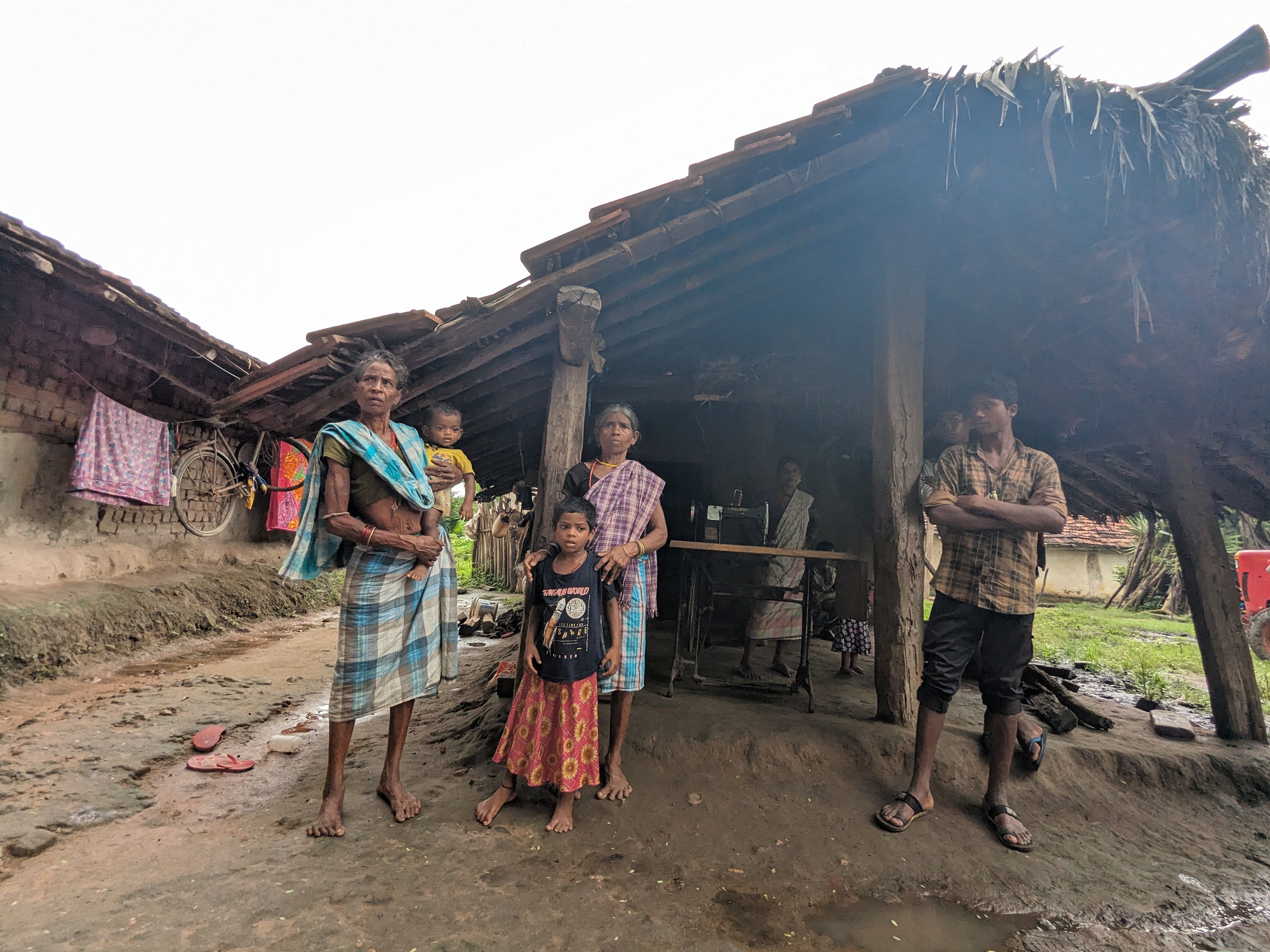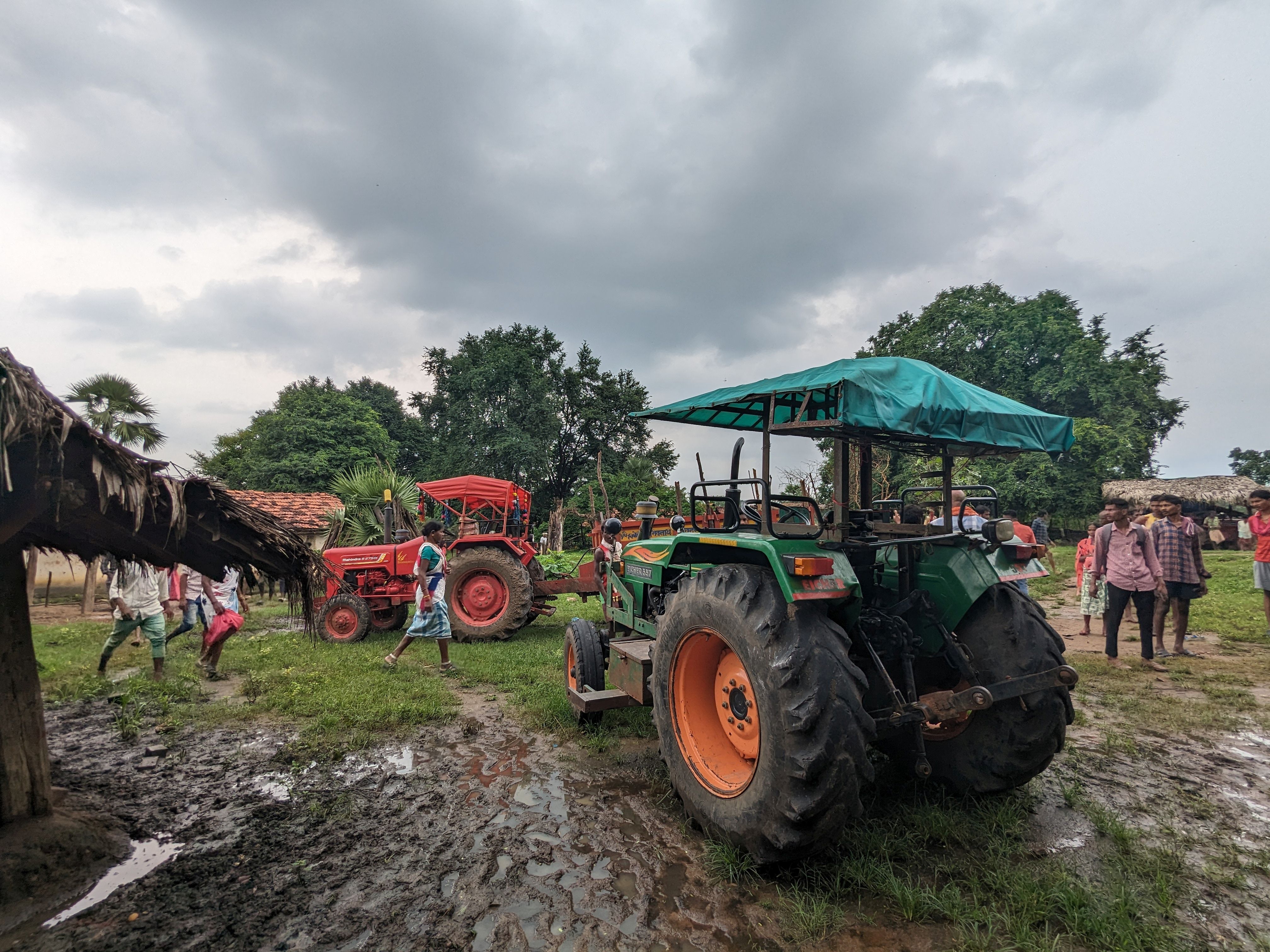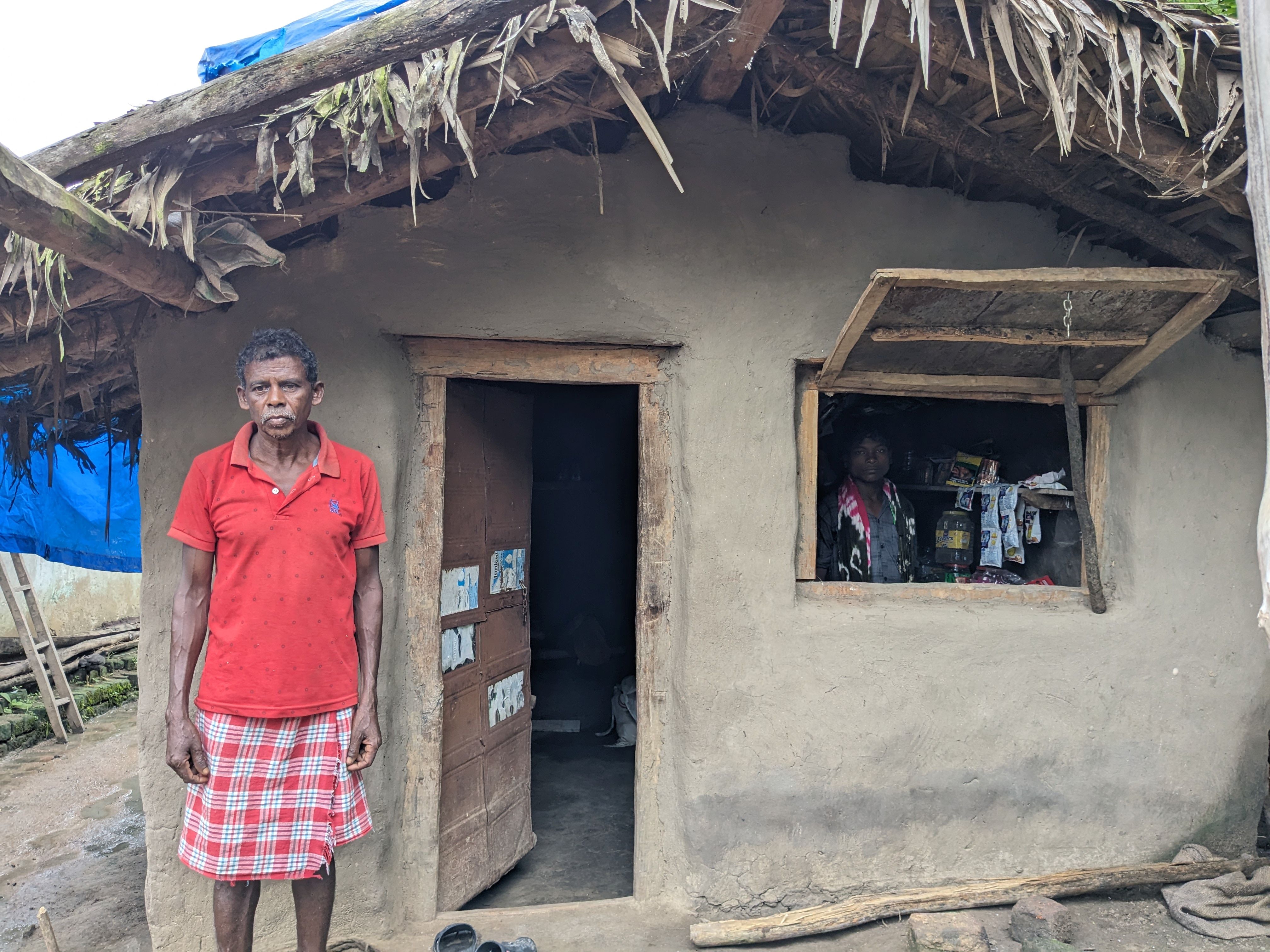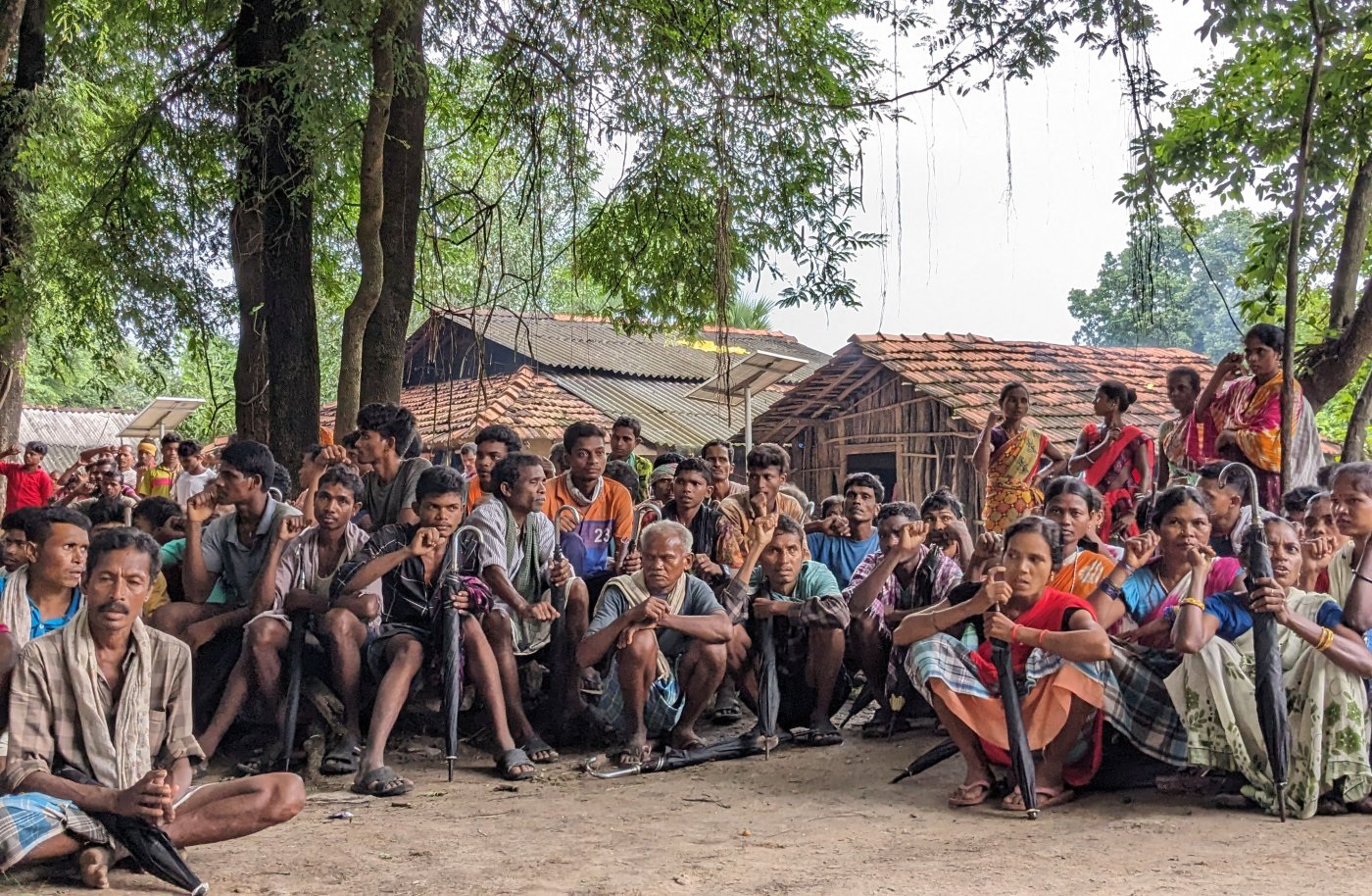Tadmetla, Sukma district (Chhattisgarh): It was a still, cloudy night in the lush, Adivasi heart of India on 4 September when Sodhi Nande heard four gunshots from the east, around 8 pm. The first two came in quick succession. There was a pause, followed by two more.
A stoic and short woman with crow's feet around the eyes and wearing two gamchas, one as a skirt and one to cover her tattered blouse, Nande, 58, was worried. Her son Sodhi Kosa, who had left that morning with a friend, planning to hitchhike on a 56 km journey to Timmapur to collect money from his sister’s husband, was not back yet.
“He is not the type to delay, so I was worried,” said Nande, who was in tears as she narrated the events of that day in their home, a mud structure plastered with cow-dung with a thatched roof.
Tadmetla is home to about 300 Adivasi households, most of them farmers.
She asked her daughter-in-law to check if Sodhi Kosa, 40, and his friend Rava Deva, 38, had returned. According to Mana, 35, Sodhi Kosa’s brother-in-law, the duo had reached Timmapur without any trouble, and had left around noon, borrowing Mana's motorcycle for the return journey.
Eyewitnesses at the Chintalnar market, 8 km north of Tadmetla, confirmed seeing them halt at the market around 2 pm on 4 September.
After this, accounts of what happened to the duo diverge.
According to the families of the two missing men, the Chhattisgarh police and paramilitary forces detained Sodhi Kosa and Deva Kosa from near Chintalnar thana or police station. The police said they were part of the Jan Militia or people’s militia—undercover foot soldiers of the outlawed Maoists.
By evening of 5 September, it was clear both men were dead. The announcement was made in a press note released by the police. “Two Maoists carrying a reward of Rs 1 lakh each were shot dead in an encounter with CRPF 223rd battalion along with DRG on September 5. A double barrel 12 bore rifle and a pistol were recovered from the spot along with the bodies,” it said, referring to the Central Reserve Police Force and the District Reserve Guard.

Fresh Tensions Ahead Of State Elections
The deaths of Sodhi Kosa and Deva Kosa were the latest fallout of a long-running battle between security forces and Maoists that has claimed over 25,000 lives in more than half a century, with villagers often caught in the middle. Indeed, Sodhi Kosa’s mother-in-law, Hadme Sodhi lost her son Sukka, a 32-year-old teacher, to Maoists, who shot him dead, she said, on 28 June.
Of the five cases police said were registered against Sodhi Kosa and Rava Deva over the past six years, for alleged involvement in the murder of three people and burning houses in two instances in 2017, one included the murder of Sukka, Kosa’s brother-in-law.
Ahead of state elections in November 2023, the latest killings in Chhattisgarh broke a tenuous peace of about two months and reginited tensions. Protests broke out, as locals accused the police of conducting an extrajudicial killing, while the lawyer representing the two men’s families alleged police did not allow her to meet the family members.
Nandini Sundar, a lawyer, author and academic who has worked extensively in regions hit by Maoist violence in Chhattisgarh, accused the state government of condoning extrajudicial killings. “For years, we have seen similar instances happen again and again, be it in Sarkeguda or Tadmetla,” she said.
She said that in 2011, when 160 houses were burnt down in Tadmetla, the Central Bureau of Investigation (CBI) had found that security personnel had led the torching. “Yet, most of the villagers got their compensation as Naxal-victims,” Sundar said. Whether it is the Bharatiya Janata Party of the Congress in power, the state has “actively protected its guilty security personnel, thus enabling these extra-judicial killings,” she said.
About 70% of the people of Bastar, a region slightly larger than the state of Kerala, are tribals. Comprising the seven districts of Bijapur, Sukma, Dantewada, Bastar, Kondagaon, Kanker and Narayanpur, the region is home to dry deciduous forests that cover more than 30% of its area and has been the focal point of the Maoist insurgency because of the vast reserves of iron ore and other minor minerals below it.
In 2006, 2009 and again in 2010, former prime minister Manmohan Singh called the Maoist insurgency “the single biggest internal security challenge” that India had ever faced (see here, here and here), their sway once extending to a third of India’s area. Since then, security forces have pushed back the Maoists, limiting their influence to a few districts of Chhattisgarh, Jharkhand, Odisha, Maharashtra and Bihar.
In Tadmetla, where in May 2012 Maoists returned the abducted Indian Administrative Service officer Alex Paul Menon who was held hostage for 13 days, there is little trust in the State as protests and accusations against the police and security forces showed.
With History Of Violence, Village Has Low Trust In State
“A woman from Mukram village 10 km south of Tadmetla saw the two men riding a bike that was tied in the front and rear to two other bikes,” said Sodhi Kosa’s cousin Joga, 32. The men’s hands were tied to the bike, he said.
According to him, the woman saw the three motorcycles near her village around 4 pm. “She came running to tell us the next morning after hearing the gunshots,” Joga told Article 14. Other villagers, from Burkapal and Morpalli, 13 km away, who had also heard gunshots, began to arrive on 5 September evening, to check what had transpired, followed soon by the police press note.
Nande said she and some others set out for Sukma, about 80 km east, to collect the dead bodies on 6 September, but when they reached the Gadgadmetta camp, 6 km from the village, police stopped them and took away their tractor keys. “We then went to Sukma on motorbikes, where we were detained at the Kotwali (town police station) that night,” she said. The next morning, police arranged a pick-up vehicle which ferried the bodies to Gadgadmetta, from where the family brought the bodies home to Tadmetla in Sodhi Kosa’s tractor.
From 6 September onwards, nearly 200 tribals in five villages protested the deaths of Rava Deva and Sodhi Kosa, denying police claims that the two were members of the Jan Militia. As of the evening of 17 September, the protest was continuing.
Sukma Superintendent of Police Kiran Chavan said the two men were killed in an “exchange of fire” between security forces and Maoists in an area between Tadmetla and Duled. “Based on technical evidences and the interrogation reports of surrendered Maoists, we found out they're Jan Militia members of Jagargunda Area Committee,” Chavan said. The Jagargunda Area Committee of the Maoists is accused of killing two men from Tadmetla in June and another man in Silger in August.
Tadmetla’s residents are no strangers to violence.
In April 2010, 76 security personnel were killed near the village, one of the biggest ever Maoists attacks against the forces. In 2011, the houses of 160 tribals were burnt, allegedly by security forces.
Believed by police to be a hotspot of Maoists, the village lies nestled deep inside the forest, more than 80 km west of district headquarters Sukma and 6 km from the nearest motorable road.
The Sodhis were among the oldest families of Tadmetla, owning some land on which they cultivated paddy. Sodhi Kosa also worked as a small miller, tractor driver and tailor. He owned a tractor bought four years ago, a sewing machine and a tractor-operated mini rice mill that now lie under the awning of the house. The tractor was bought through a bank loan, and his guarantor had been Rava Deva, the friend killed with him.
Sodhi Kosa lived with his three children, two girls, Mooke (7) and Deve (4), and a son Joga (2), his mother Nande and his wife, also named Nande (30). He was also caretaker to his mother-in-law Hadme, who moved in next door after her son Sukka’s death in June. He had a ration card, but his Aadhar card application was rejected after five attempts due to a technical error.

Sodhi Kosa’s mother Nande said he didn't consume even traditional alcohol, and was a diligent worker. “Even on the day of his death, he had gone to settle a business deal and to buy fish seeds for our ponds from the money he was supposed to get,” she said. “The police didn't even let me bid him a proper goodbye.”
'Why Wouldn't They Let Me Meet The Families?'
On 7 September, police dropped the dead bodies near the Gadgadmetta security camp. “They asked us to make our way back to the village along with the bodies on our own,” said Madkam Deva, a village resident.
Eventually, somebody drove Sodhi Kosa’s tractor with the bodies, while others trekked the 6-km unmotorable road to the village.
She said as relatives and villagers sat mourning the two men and waiting for the family members of both to conduct the last rites, District Reserve Guard (DRG) personnel came to Tadmetla and forcibly took the bodies to the cremation area, accompanied by only a few immediate family members.
“In a hurry, they took whatever wood they could find and poured diesel on the bodies and set them ablaze,” said Madkam Deva. “When we tried to protest, they seized my phone.” She got the device back the following day.
According to Hadme and Nande, both of whom speak only Gondi, the DRG personnel stayed for a while, taking pictures of the gathering around the burning pyres, and then left. “The bodies were not completely burnt; they were only charred as there was not enough wood,” Madkam Deva said.
Some family members returned the following day to burn the bodies fully. He added, “Security forces kept a close watch around our village, not even allowing us to go to the ration shop in Chintalnar.”
Sukma police denied the claims, despite photo evidence of the charred bodies. “The bodies were not completely burnt because it rained that night,” SP Chavan said. He said police have photo and video evidence of the family receiving the body, a panchnama (inquest) report of the dead body and a supurdnama (a document regarding handing over of the body).
The supurdnama bears the date of 6 September, though the executive magistrate recounted to Article 14 that the panchnama of the body took place on 5 September.
Human rights lawyer Bela Bhatia, who is representing the families, alleged that the killing was not in an exchange of fire. “If the police had done everything to procedure, why wouldn't they let me go to meet the families? I was unlawfully stopped citing reasons of my safety for two days by the police and security forces,” she told Article 14. She said villagers were stopped from coming out of the jungle to meet the lawyers, and the family was not given the supurdnama or the inquisition report.
Both families told Article 14 they did not receive such a document.
“The police followed all due procedures as is needed in such cases,” said SP Chavan. “We have documentary proof that the police didn't interfere in the rituals and that the families are talking under the influence and pressure of Maoists active in that area.”
According to Sukma district collector Harish S, as per procedure in encounter killings, a magisterial inquiry has been ordered and a sub-divisional officer has been tasked to ascertain the facts of the case.
‘Wanted’ Men Had Official Documents, Bank Loan
At a joint press conference held by the wives of the deceased men and CPI leader and former legislator Manish Kunjam in Sukma on 11 September, the family accused the police of conducting a fake encounter to stop Kunjam's political rallies in the area.
According to Kunjam, he was supposed to conduct a meeting at Elmagunda, 21 km south of Tadmetla, on 5 September.
“I was en route when I received a call from the SP at around 10.30 am who told me to stop and return as an exchange of fire was underway between Tadmetla and Duled villages,” he told Article 14. He said his sources in both villages heard no gunshots.
He was scheduled to hold another meeting in a village named Minpa, 9 km from Tadmetla, on 9 September. “I was told by some police officials on 6 September to cancel the plan,” he said. “We eventually had to postpone that meeting to help these families escape police scrutiny and come to Sukma to hold this press conference.”
He said both men used to frequent Dornapal and Sukma towns, and were known to the local police. If the police had technical evidence against them, they could have been picked up for questioning earlier, he said.
At the press conference, Rava Deva's business partner in a small grocery store, Joga, said Deva was known to the Dornapal station in-charge.
Rava Deva handled the work of stocking their store, and thus would frequent Dornapal, even meeting the local thana in-charge. “Everytime we would get a pick-up van full of items from Dornapal, we would get checked and registered at the thana and at the six security camps between Dornapal and Tadmetla,” Joga said. “If he was a Maoist, and the police suspected him to be a Jan Militia member, why didn't they ever apprehend him?"
Back in the village, a locked tin door protected the meagre grocery items available in the store—small bottles of hair oil, sachets of shampoo priced at Rs 0.50 and packets of paan masala. The shop is a mud structure adjacent to the house Deva lived in along with his wife Soni (42) and his orphaned cousin Kosa (14) who the couple were raising as their child.

Rava Deva’s sister-in-law Devi Rava (39) said he had started the shop three years ago with a capital loan of Rs 20,000 from Sodhi Joga. Rava Deva had a PAN Card, an Aadhaar card and two bank accounts, one in Axis Bank in Pollampalli and one in Grameen Bank in Dornapal. He was also guarantor for Sodhi Kosa's tractor loan.
"If he were a Maoist, would he have so many documents?” she asked.
According to SP Chavan, all Jan Militia members hold government-issued IDs. “The Maoists want their foot soldiers to stay in the village without raising suspicions and have all documents to freely roam in and out of the village and nearby towns,” he said. He said it was unfortunate that some people were trying to destroy the morale of the police and security forces. “The Maoists are also mobilising people against us using misinformation, as they do for all encounters,” he said.
Sodhi Kosa’s wife Nande was allegedly evacuated from the village by local youth to bring her to the press conference. “I want to go back to my mother and my children as soon as possible,” she said with a heavy voice. She had found a corner to feed Joga, her youngest, some hotel-made dal-rice. Even as the child fussed, she stole a couple of morsels for herself, before handing the child back to a relative.
Meanwhile, the Maoists’ Dakshin Bastar divisional committee secretary who goes by the pseudonym ‘Ganga’ released a press note stating that neither of the two dead men were part of any arm of the outlawed organisation. The note also denied there had been an encounter between forces and Maoists that day.
In response, Bastar inspector general of police G P Sundarraj released a counter-statement. “If the Maoists claim that these two men were not involved in the death of two people from Tadmetla in June, then they have 48 hours to tell us the names of the people involved in the case,” the statement said, claiming that Maoists were misleading and forcing people to protest.
Chhattisgarh is a poll-bound state with only a couple of months remaining before the election.
The Konta constituency, from where MLA Kawasi Lakhma was elected in 2018, witnessed a mass protest in Silger, 35 km from Tadmetla, in 2021, after five people were killed when security forces opened fire on an unarmed group of protestors. According to Madkam Bheema (28), a resident of Morpalli village who was one of the 100 people in Tadmetla protesting the recent deaths, the tribals were being killed by both, the Maoists and the police.
“Tomorrow, the police will kill me, claiming I was a Maoist,” he said. “Hence, I am protesting, to save myself and my children from these mindless deaths.”
(Gargi Verma is an independent journalist based in Raipur, Chhattisgarh.)
Get exclusive access to new databases, expert analyses, weekly newsletters, book excerpts and new ideas on democracy, law and society in India. Subscribe to Article 14.

